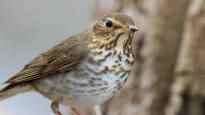Climate change has been found to reduce the size of birds, but the magnitude of the change varies by species.
Bird scientists have long found that climate change is shrinking the size of birds. So far, no exact cause has been found for the phenomenon.
Presumably, rising temperatures are causing stress to birds. From a smaller body, heat can be evaporated more efficiently than from a large one.
The decline of birds has its drawbacks. They are even less able to stand up to predators or defend their food. However, natural selection seems to drive birds to shrink despite the disadvantages.
There are significant differences between bird species, as some species have declined more than others.
Led by the University of Washington in St. Louis, USA in research (you move to another service)approximately 70,000 bird units were measured. The birds had died between 1978 and 2016 after colliding with buildings in Chicago.
The researchers found that those species in which the brain was remarkably large compared to the rest of the body had significantly less shrinkage than those in the cerebellar species.
For example, the size of songbirds (Melospiza melodia) decreased by 70% less than that of ravens (Catharus ustulatus). The size of the brains of songbirds relative to the rest of the body is remarkably large, while the opposite is true of the raven.
Smart adapt?
The authors of the study believe that the small change in the size of birds suggests that they are understanding to change their behavior with climate change. If so, research would be the first to link birds ’cognitive abilities and the change in birds’ behavior required by climate change.
The relative size of the brain is believed to be related to the intellectual capacity of birds.
– The relative size of the brain is related to learning ability, memory, life expectancy and [lintu]with the stability of population size, said the doctoral student who led the study Justin Baldwin to the British To Independent (you will switch to another service).
“In this case, cerebellar species can reduce their exposure to high temperatures, for example, by accessing cooler parts of their habitats,” Baldwin reflects.
With a difference of up to 70% between species, the researchers believe that even small differences in the cognitive abilities of birds have an effect.
The change in nature brings a lot of losers and few winners
He points out, however, that there were plenty of circadian birds and cerebellar lumps known to be cerebellar in the study. In these, the result of the study was clear.
Researchers at the University of Washington emphasize that while some birds have survived climate change with only minor changes, it cannot be concluded that cerebellar birds would do well.
Bird populations in North America are estimated to have declined by a third since the 1970s for a variety of reasons. About three billion birds have disappeared.
“Nature selection plays a big part in this, and it treats different bird species in different ways,” says Baldwin.
The rapid change in the state of nature, for example due to climate change, will result in a lot of losers and few winners, Baldwin continues. Researchers believe that the research results can be utilized in bird conservation work.
Versatile do better
Director of Conservation and Research, BirdLife Finland Teemu Lehtiniemi thinks that the result of the study is logical, although the success of birds is affected by many factors.
– In general, species with a diverse lifestyle do better than species that specialize in habitats or food, for example, he tells by telephone.
In the case of wintering species in Finland, the requirements for feather clothing and nutrition, for example, are quite different from those of those that spend the winter in the south.
Habitat changes can be overwhelming for birds.
– No matter how smart an insectivore is, it can’t survive if there are no insects available, Lehtiniemi says.
Of the Finnish species, crows have been found to be intelligent. For example, they are able to take advantage of the food left behind by humans.
In Finland, researchers at Åbo Akademi University Kim Jaatinen and Markus Öst have studied the relationship between bird head size and the avoidance of predators, for example. What they got results (switch to another service) are parallel.
